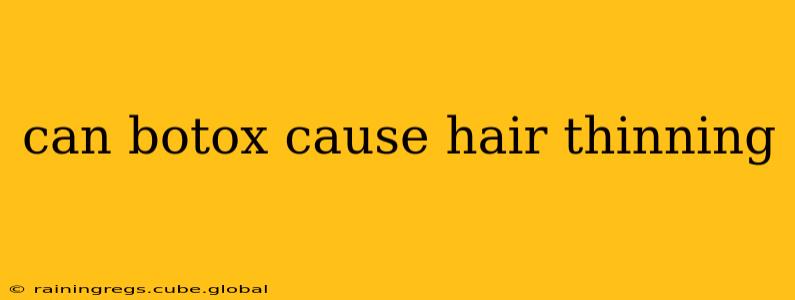Botox, a popular cosmetic treatment used to reduce wrinkles, has become increasingly prevalent. However, a question frequently arises: can Botox cause hair thinning? While the direct link isn't definitively established, the possibility warrants exploration. This article will delve into the current understanding, examining the potential connection and addressing common concerns.
What is Botox?
Before addressing the potential link to hair thinning, it's crucial to understand what Botox is. Botulinum toxin type A, commonly known as Botox, is a neurotoxic protein. When injected, it temporarily blocks nerve signals to muscles, preventing them from contracting and thus reducing the appearance of wrinkles. The effects are localized to the injection site and are temporary, typically lasting several months.
Can Botox Cause Hair Thinning? The Evidence
The short answer is: there's no conclusive scientific evidence directly linking Botox injections to hair thinning. Most reported cases of hair loss in association with Botox are anecdotal and often involve other contributing factors. However, several indirect mechanisms are hypothesized:
1. Stress and Hair Loss:
The process of getting Botox injections, while generally minimally invasive, can still cause stress for some individuals. Stress is a well-known trigger for various types of hair loss, including telogen effluvium, a temporary shedding of hair. This shedding typically occurs several weeks after a stressful event. Therefore, any observed hair thinning could be indirectly related to the stress of the procedure rather than the Botox itself.
2. Improper Injection Technique:
Improper injection techniques, especially if the injection site is too close to the scalp or hair follicles, could theoretically damage the hair follicles. However, this is rare with properly trained and experienced professionals. A qualified practitioner will have an in-depth understanding of facial anatomy and will avoid areas close to the hairline to mitigate this risk.
3. Underlying Medical Conditions:
Hair loss is often associated with underlying medical conditions such as hormonal imbalances, nutritional deficiencies, autoimmune disorders, or certain medications. If someone already has a predisposition to hair loss, Botox injections would not be the direct cause, but any observed hair thinning might coincide with the treatment.
4. Topical Products Used Before or After Treatment:
Some individuals might use topical products before or after Botox treatment that could potentially contribute to hair thinning. Certain ingredients in hair products can irritate the scalp or damage hair follicles, so it’s crucial to choose suitable products.
Does Botox Affect Hair Growth in Other Ways?
While the evidence for Botox causing hair thinning is weak, some research suggests it might potentially benefit hair growth in other ways. There's ongoing research into the use of Botox for treating conditions like excessive sweating (hyperhidrosis) in the scalp, which can sometimes contribute to hair loss. By reducing scalp sweating, Botox might indirectly improve scalp health. However, this is still an area of ongoing investigation, and more research is needed.
What to Expect During and After Botox Treatment:
Following proper pre- and post-treatment care can minimize potential issues. Choosing a qualified, experienced practitioner is crucial. Discuss any concerns about potential side effects, including hair loss, openly before the procedure. Also, be honest about any existing medical conditions or medications you are taking.
Frequently Asked Questions
Can Botox injections near the hairline cause hair loss?
While theoretically possible with improper injection technique, this is rare when the procedure is performed by a qualified professional. They understand facial anatomy and will avoid injecting near the hairline to reduce this risk.
Is hair loss a common side effect of Botox?
Hair loss is not a documented or common side effect of Botox. The reported cases are often linked to other contributing factors such as stress or underlying medical conditions.
What should I do if I experience hair loss after a Botox injection?
If you notice hair thinning after a Botox treatment, consult your doctor or dermatologist. They can help determine the cause and recommend appropriate treatment options. It is crucial to rule out any underlying medical conditions contributing to the hair loss.
Are there any alternatives to Botox for wrinkle reduction?
Yes, various alternatives are available, including fillers, chemical peels, microdermabrasion, laser treatments, and retinoids. Discuss these alternatives with a dermatologist or cosmetic surgeon to determine the most suitable option for your individual needs.
In conclusion, although a direct link between Botox and hair thinning hasn't been definitively proven, several indirect factors may contribute to hair loss around the time of a Botox treatment. Choosing a qualified practitioner and addressing any underlying medical conditions are crucial for minimizing the risk of unwanted side effects. Always consult your doctor or dermatologist to discuss any concerns.
